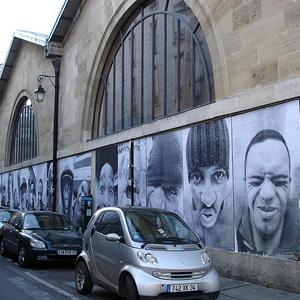Qatar Plan to Invest in Muslim Populated Paris Suburbs Makes Some French Uneasy
Paris suburb Clichy-sous-Bois (Photo: cicilief/Flickr)
A Qatari proposal that the Arab League put a billion dollars into Muslim and Arab interests in Jerusalem has, unsurprisingly, angered some Israeli leaders.
Oil-rich Qatar invests extensively around the world without a hitch. One of the largest recipients of Qatari money is France, where the Gulf state bankrolls media and construction companies and owns Paris-Saint Germain, now one of the world's richest soccer clubs.
But France is also another example of how efforts to support largely Muslim populations in non-Muslim countries can raise hackles.
This is the tangled story of one Qatari investment plan.
Back in 2011, leaders from some of Paris' largely Muslim suburbs got together to discuss a crisis. There was the European economic crisis, and there was the deeper crisis among the children of immigrants living in low-income suburbs. In some of these towns, the unemployment rate hovers above 20 percent. It's even higher for young people.
"We said we had to do something," says Leila Leghmara, a city councilor from the suburb of Colombe and a member of ANELD, an association of suburban minority politicians. "We thought about Qatar because we knew that Qatar invested everywhere, in big companies, and so we said, 'maybe they would be interested in investing in the suburbs,' so we met with the ambassador."
The Qatari Ambassador arranged for the group to fly to Doha to meet with the Emir. Leghmara says ANELD spent an afternoon with the Emir and he showed interest in providing loans for suburban youths with promising business ideas. Qatar announced the creation of a fund of about $65 million.
Then things got complicated. France's left and right joined together in condemning the plan. On the left is Eric Coquerel, a spokesman for the left-wing Liberal Front.
"Why would Qatar invest?" he says. "An investment never comes without strings. The danger is that it could be investing with the idea of promoting a certain religion or a certain way of life. That's not a good thing."
Center-right lawmaker Nicolas Dupont-Aignan went further. He says he hates the idea of Muslim countries, like Qatar, giving money to Muslim communities in France. "I don't like that religious affairs be decided in Qatar," he says, "because we have a new religion —the Muslim religion — in France, and this Muslim religion is financed by Algeria, Morocco, Tunisia, et cetera… It's very dangerous."
Leila Leghmara says a Qatar fund for entrepreneurs shouldn't worry anyone. "The only objective of Qatar is to invest," she says. "It's just a money matter. They invest everywhere, anywhere, and they know that within these suburbs there are people with a lot of talent, and they know that they can make money with these people because they have great ideas."
Others doubt that's Qatar's motive. Gilles Kepel is an expert on Islam in the French suburbs, or banlieues. "Most of those things in the banlieues, they would not make money," he says. "They're buying influence."
But a young entrepreneur named Mounir Benjaffal says, so what if they are? "I'm not pro-Qatari," he says. "I don't have the flag of the Qatari state in my room, but the thing is Qatar right now is needing this aura, is needing to make promotion."
And Benjaffal could use Qatar's help. He started an electronics innovation lab in the Paris suburb of Cergy and has just printed his first catalog. But he says getting loans in this economic environment is incredibly difficult. It's even harder if you're the son of North African Muslim immigrants.
"Talking frankly," he says, "from my origin, it is more difficult to have a loan from the bank, to have a contract, or to get a job. It is difficult to prove, but it is very easy to feel."
He says the Qatar investment fund could help counteract that, but no one seems to know what's happening with the fund.
Former president, Nicolas Sarkozy, put it on hold in 2011. When Francois Hollande replaced Sarkozy last year, he said the fund would go forward, with matching investment from his own government. The group ANELD was supposed to help administer it. But ANELD's Leghmara says she's heard little since then.
Neither French nor Qatari officials would comment for this story, though a French government spokesman did say they're still debating the plan, but should make a decision soon.
During the years of debating and waiting, the size of the promised funds has apparently tripled, to almost $400 million. And there's another change: Potential recipients could be anywhere in France. The fund is no longer dedicated to the young entrepreneurs of the Paris suburbs.
